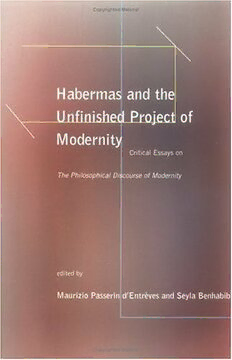
Habermas and the Unfinished Project of Modernity: Critical Essays on The Philosophical Discourse of Modernity PDF
159 Pages·1997·15.633 MB·English
Most books are stored in the elastic cloud where traffic is expensive. For this reason, we have a limit on daily download.
Preview Habermas and the Unfinished Project of Modernity: Critical Essays on The Philosophical Discourse of Modernity
Description:
This collection of ten essays offers the first systematic assessment of Jürgen Habermas's Philosophical Discourse of Modernity, a book that defended the rational potential of the modern age against the depiction of modernity as a spent epoch. The essays (of which four are newly commissioned, five were published in the journal Praxis International, and one -- by Habermas -- first appeared in translation in New Critique) are divided into two sections: Critical Rejoinders and Thematic Reformulations. An opening essay by d'Entrèves sets out the main issues and orients the debate between Habermas and the postmodernists by identifying two different senses of responsibility: a responsibility to act versus a responsibility to otherness (an openness to difference, dissonance, and ambiguity). These are linked with two alternative understandings of the primary function of language: action-orienting versus world-disclosing. This is a fruitful way of looking at the issues that Habermas has raised in his attempt to resurrect and complete the project of Enlightenment. Habermas's essay discusses the main themes of his book in the context of a critical engagement with neoconservative cultural and political trends. The main body of essays offer an interesting collection of points of view, for and against Habermas's position by philosophers, social scientists, intellectual historians, and literary critics. SECTIONS & CONTRIBUTORS: Introduction, Maurizio Passerin d'Entrèves. Modernity versus Postmodernity, Jürgen Habermas. Critical Rejoinders: Fred Dallmayr. Christopher Norris. David C. Hoy. James Schmidt. Joel Whitebook. Thematic Reformulations: James Bohman. Diana Coole. Jay M. Bernstein. David Ingram.
See more
The list of books you might like
Most books are stored in the elastic cloud where traffic is expensive. For this reason, we have a limit on daily download.
